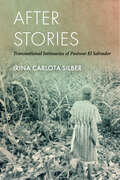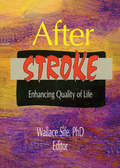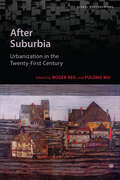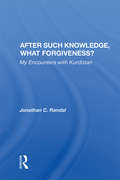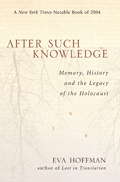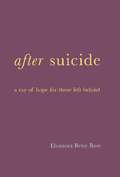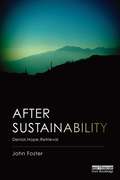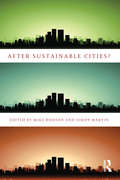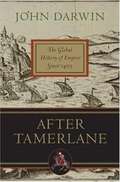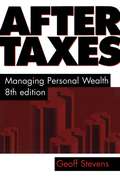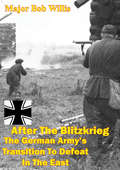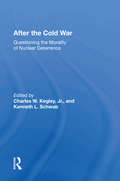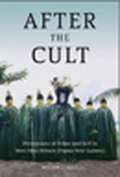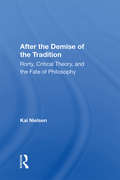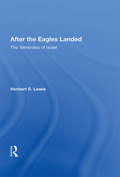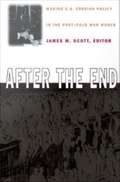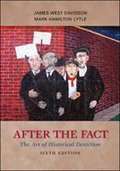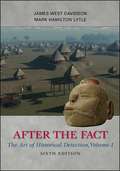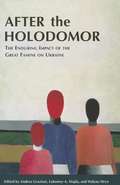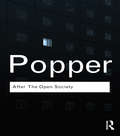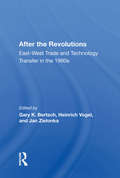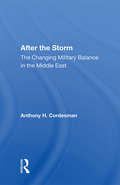- Table View
- List View
After Stories: Transnational Intimacies of Postwar El Salvador
by Irina Carlota SilberThis book builds upon Irina Carlota [Lotti] Silber's nearly 25 years of ethnographic research centered in Chalatenango, El Salvador, to follow the trajectories—geographic, temporal, storied—of several extended Salvadoran families. Traveling back and forth in time and across borders, Silber narrates the everyday unfolding of diasporic lives rich with acts of labor, love, and renewed calls for memory, truth, and accountability in El Salvador's long postwar. Through a retrospective and intimate ethnographic method that examines archives of memories and troubles the categories that have come to stand for "El Salvador" such as alarming violent numbers, Silber considers the lives of young Salvadorans who were brought up in an everyday radical politics and then migrated to the United States after more than a decade of peace and democracy. She reflects on this generation of migrants—the 1.5 insurgent generation born to forgotten former rank-and-file militants—as well as their intergenerational, transnational families to unpack the assumptions and typical ways of knowing in postwar ethnography. As the 1.5 generation sustains their radical political project across borders, circulates the products of their migrant labor through remittances, and engages in collective social care for the debilitated bodies of their loved ones, they transform and depart from expectations of the wounded postwar that offer us hope for the making of more just global futures.
After Stroke: Enhancing Quality of Life
by Wallace SifeAfter Stroke: Enhancing Quality of Life brings together an extraordinary selection of advice, practical survivor techniques, information about resources, and personal stories of triumph. It is designed to help those who have experienced a stroke attain the highest quality of life possible, under their new physical restrictions.Recuperating from a stroke is an arduous process that has only just begun when the survivor is released from the hospital. This book shows anyone interested how to create an effective climate for healing and how to help the survivor realize his/her fullest recovery potential. It offers varied perspectives of everyone involved with a stroke: the patient, the family, and friends as well as the team of specialized physicians, nurses, psychologists, physical therapists, speech pathologists, and diverse therapists.Through its interesting and varied essays, After Stroke: Enhancing the Quality of Life offers the reader a clearer understanding of the injuries that the body as well as the mind have sustained. This anthology is carefully designed to present enhanced perspectives into all aspects of the healing and recovery processes that follow the personal tragedy of a stroke.
After Suburbia: Urbanization in the Twenty-First Century (Global Suburbanisms)
by Roger Keil Fulong WuAfter Suburbia presents a cross-section of state-of-the-art scholarship in critical global suburban research and provides an in-depth study of the planet’s urban peripheries to grasp the forms of urbanization in the twenty-first century. Based on cutting-edge conceptual thought and steeped in richly detailed empirical work conducted over the past decade, After Suburbia draws on research from Asia, Africa, Australia, Europe, and the Americas to showcase comprehensive global scholarship on the urban periphery. Contributors explicitly reject the traditional centre-periphery dichotomy and the prioritization of epistemologies that favour the Global North, especially North American cases, over other experiences. In doing so, the book strongly advances the notion of a post-suburban reality in which traditional dynamics of urban extension outward from the centre are replaced by a set of complex contradictory developments. After Suburbia examines multiple centralities and diverse peripheries which mesh to produce a surprisingly contradictory and diverse metropolitan landscape.
After Such Knowledge, What Forgiveness?: My Encounters With Kurdistan
by Jonathan C. RandalThis book is about the Kurds and Kurdistan, discussing Kurdish nationalist aspirations, the repeated Kurdish revolts, and the rogue chromosome in Kurdish genetics causes what Indians, with their love of fancy words, would call "fissiparous tendencies."
After Such Knowledge: Memory, History, and the Legacy of the Holocaust
by Eva HoffmanSixty years after the Holocaust, the author of "Lost in Translation" explores the difficult process of preserving an authentic version of its tragic events
After Suicide: A Ray of Hope for Those Left Behind
by Eleanora Betsy RossAn extraordinary book that is a must for all people who have suffered or those who wish to support and counsel the bereaved. -Ari Kiev, M. D. , J. D. , author of A Strategy for Daily Living
After Sustainability: Denial, Hope, Retrieval
by John FosterDangerous climate change is coming. Some people still deny that it is happening. Others refuse to recognise that it is now too late to prevent it. But both these reactions spring from the same source: our pathological attachment to ‘progress’, of which sustainability has been one more version. After Sustainability traces that attachment to its roots in the ways we make sense of ourselves. Original and accessible, this is philosophy on the edge, written for anyone who glimpses our environmental tragedy and cares about our future. Does the challenge to stop pretending offer our only remaining chance? Read this book and make up your own mind.
After Sustainable Cities?
by Simon Marvin Mike HodsonA sustainable city has been defined in many ways. Yet, the most common understanding is a vision of the city that is able to meet the needs of the present without compromising the ability of future generations to meet their own needs. Central to this vision are two ideas: cities should meet social needs, especially of the poor, and not exceed the ability of the global environment to meet needs.After Sustainable Cities critically reviews what has happened to these priorities and asks whether these social commitments have been abandoned in a period of austerity governance and climate change and replaced by a darker and unfair city. This book provides the first comprehensive and comparative analysis of the new eco-logics reshaping conventional sustainable cities discourse and environmental priorities of cities in both the global north and south. The dominant discourse on sustainable cities, with a commitment to intergenerational equity, social justice and global responsibility, has come under increasing pressure. Under conditions of global ecological change, international financial and economic crisis and austerity governance new eco-logics are entering the urban sustainability lexicon – climate change, green growth, smart growth, resilience and vulnerability, ecological security. This book explores how these new eco-logics reshape our understanding of equity, justice and global responsibility, and how these more technologically and economically driven themes resonate and dissonate with conventional sustainable cities discourse. This book provides a warning that a more technologically driven and narrowly constructed economic agenda is driving ecological policy and weakening previous commitment to social justice and equity. After Sustainable Cities brings together leading researchers to provide a critical examination of these new logics and identity what sort of city is now emerging, as well as consider the longer-term implication on sustainable cities research and policy.
After Tamerlane: The Global History Of Empire Since 1405
by John DarwinA Rise and Fall of the Great Powers for the post-Cold War era--a brilliantly written, sweeping new history of how empires have ebbed and flowed over the past six centuries. The death of the great Tatar emperor Tamerlane in 1405, writes historian John Darwin, was a turning point in world history. Never again would a single warlord, raiding across the steppes, be able to unite Eurasia under his rule. After Tamerlane, a series of huge, stable empires were founded and consolidated-- Chinese, Mughal, Persian, and Ottoman--realms of such grandeur, sophistication, and dynamism that they outclassed the fragmentary, quarrelsome nations of Europe in every respect. The nineteenth century saw these empires fall vulnerable to European conquest, creating an age of anarchy and exploitation, but this had largely ended by the twenty-first century, with new Chinese and Indian super-states and successful independent states in Turkey and Iran. This elegantly written, magisterial account challenges the conventional narrative of the "Rise of the West," showing that European ascendancy was neither foreordained nor a linear process. Indeed, it is likely to be a transitory phase. After Tamerlane is a vivid, bold, and innovative history of how empires rise and fall, from one of Britain's leading scholars. It will take its place beside other provocative works of "large history," from Paul Kennedy's The Rise and Fall of the Great Powers to David Landes's The Wealth and Poverty of Nations or Niall Ferguson's Empire.
After Taste: Expanded Practice in Interior Design
by Kent Kleinman Joanna Merwood-Salisbury Lois WeinthalWhat is taste? This well-curated collection documents new theories and emerging critical practices in the field of interior design. It investigates taste, a concept central to the formation of the discipline in the eighteenth century that was repudiated by architects in the early twentieth century, but which continues to play an important role in interior design today. Essays by historians and critics are complemented by interviews with practitioners on the margins of normative practice and portfolios of the work of contemporary designers.
After Taxes: Managing Personal Wealth 8th Edition
by Geoff StevensMaximizing one’s savings is the surest way to guarantee that there is life after taxes. The truly successful investor begins with careful tax planning, which must never be a last-minute scramble in the dreadful month of March or worse still, April! We all know that few of us actually plan well ahead, as we ought to, to protect ourselves and our hard-earned money. This book may well be the answer. Based on The Gasletter Collection, the author’s successful primer on sheltering your income, After Taxes is designed to help the working individual put in place a long-term strategy. An easy-to-understand handbook, it helps the reader wrestle with the implications of retirement funds, savings, off-shore shelters, investments, mutual funds, real estate, buyouts, separation allowances, and golden (or not-so-golden) handshakes. A must for those who wish to make informed financial decisions and better choices to guarantee a secure future.
After The Blitzkrieg: The German Army’s Transition To Defeat In The East
by Major Bob E. Willis Jr.The German invasion of the Soviet Union in June 1941 sparked a guerilla resistance unparalleled in modern history in scale and ferocity. In the wake of the initial invasion, the German Army began its struggle to secure a territory encompassing one million square miles and sixty-five million people and to pacify a growing partisan resistance. The German endeavor to secure the occupied areas and suppress the partisan movement in the wake of Operation Barbarossa illustrates the nature of the problem of bridging the gap between rapid, decisive combat operations and "shaping" the post-major conflict environment-securing populations and infrastructure and persuading people to accept the transition from a defeated government to a new one. In this regard, the German experience on the Eastern Front following Operation Barbarossa seems to offer a number of similarities to the U.S. experience in Iraq in the aftermath of OIF. This study highlights what may be some of the enduring qualities about the nature of the transition between decisive battle and political end state-particularly when that end state is regime change. It elaborates on the notion of decisive battle, how the formulation of resistance movements can be explained as complex adaptive systems, the potential of indigenous security forces and the influence of doctrine, cultural appreciation and interagency cooperation on operational-level transition planning.
After The Cold War: Questioning The Morality Of Nuclear Deterrence
by Charles KegleyThis is a text on the traditional questions of nuclear deterrence and the unconventional answers suggested by the emerging new world order. These widely-ranging essays by scholars, policymakers and moral philosophers present rival ideas about the morality of alternative means for preserving mutual security as the world moves beyond the Cold War.
After The Cult
by Holger JebensIn many parts of the world the "white man" is perceived to be an instigator of globalization and an embodiment of modernity. However, so far anthropologists have paid little attention to the actual heterogeneity and complexity of "whiteness" in specific ethnographic contexts. This study examines cultural perceptions of other and self as expressed in cargo cults and masked dances in Papua New Guinea. Indigenous terms, images, and concepts are being contrasted with their western counterparts, the latter partly deriving from the publications and field notes of Charles Valentine. After having done his first fieldwork more than fifty years ago, this "anthropological ancestor" has now become part of the local tradition and has thus turned into a kind of mythical figure. Based on anthropological fieldwork as well as on archival studies, this book addresses the relation between western and indigenous perceptions of self and other, between "tradition" and "modernity," and between anthropological "ancestors" and "descendants." In this way the work contributes to the study of "whiteness," "cargo cults" and masked dances in Papua New Guinea.
After The Demise Of The Tradition: Rorty, Critical Theory, And The Fate Of Philosophy
by Kai NielsenThis ambitious book addresses the "end-of-philosophy" debate and the challenge it presents to contemporary philosophy, both continental and analytic. It is a chain of argument as well as a conversation conducted in the presence of the major contributors to that debate: the critics (especially Richard Rorty) of the dominantly Platonic-Cartesian-Kantian tradition on the one hand and its defenders on the other. Nielsen's account draws on Wittgenstein, Quine, Davidson, Habermas, and Foucault, among others. Nielsen takes Rorty's arguments seriously and insists that they demand a rethinking of the role of philosophy in a world in which the claims of relativism, nihilism, and historicism loom increasingly larger. But, unlike most who are impressed with the end-of-philosophy argument, he provides an original and constructive response: the development of a holistic, antifoundationalist account of philosophy that utilizes a form of critical theory and wide reflective equilibrium in carving out a positive role for a new kind of philosophy. This is an important book not just for philosophers but tor social theorists, for literary critics, and indeed for scholars in any field in which the status of knowledge has become problematic.
After The Eagles Landed: The Yemenites Of Israel *now Available Thru Waveland Press *waveland Tel#-708-634-0081
by Herbert S. LewisThis book portrays aspects of the life of a community of over 1,200 Jews who were either born in Yemen, or who were, in 1975–77, the young sons and daughters of immigrants from Yemen. It contains implications for the important and currently debated topic of ethnic integration in Israel.
After The End: Making U.S. Foreign Policy in the Post-Cold War World
by James M. ScottIn the political landscape emerging from the end of the Cold War, making U. S. foreign policy has become more difficult, due in part to less clarity and consensus about threats and interests. In After the End James M. Scott brings together a group of scholars to explore the changing international situation since 1991 and to examine the characteristics and patterns of policy making that are emerging in response to a post-Cold War world. These essays examine the recent efforts of U. S. policymakers to recast the roles, interests, and purposes of the United States both at home and abroad in a political environment where policy making has become increasingly decentralized and democratized. The contributors suggest that foreign policy leadership has shifted from White House and executive branch dominance to an expanded group of actors that includes the president, Congress, the foreign policy bureaucracy, interest groups, the media, and the public. The volume includes case studies that focus on China, Russia, Bosnia, Somalia, democracy promotion, foreign aid, and NAFTA. Together, these chapters describe how policy making after 1991 compares to that of other periods and suggest how foreign policy will develop in the future. This collection provides a broad, balanced evaluation of U. S. foreign policy making in the post-Cold War setting for scholars, teachers, and students of U. S. foreign policy, political science, history, and international studies. Contributors. Ralph G. Carter, Richard Clark, A. Lane Crothers, I. M. Destler, Ole R. Holsti, Steven W. Hook, Christopher M. Jones, James M. McCormick, Jerel Rosati, Jeremy Rosner, John T. Rourke, Renee G. Scherlen, Peter J. Schraeder, James M. Scott, Jennifer Sterling-Folker, Rick Travis, Stephen Twing
After The Fact: The Art Of Historical Detection
by James West Davidson Mark H. LytleUnder the historians eye, the puzzles of the past turn and reveal themselves. Here are good stories well told, displaying the essential fascination of scholarship in action and what it can accomplish.
After The Fact: The Art of Historical Detection, Volume 1
by James West Davidson Mark H. LytleFor more than twenty-five years, <i>After the Fact</i> has guided students through American history and the methods used to study it. In dramatic episodes that move chronologically through American history, this best-selling book examines a broad variety of topics including oral evidence, photographs, ecological data, films and television programs, church and town records, census data, and novels. Whether for an introductory survey or for a historical methods course, <i>After the Fact</i> is the ideal text to introduce readers, step by step, to the detective work and analytical approaches historians use when they are actually doing history.
After The Holodomor: The Enduring Impact Of The Great Famine On Ukraine (Harvard Papers In Ukrainian Studies #12)
by Nicolas Werth Jacques Vallin France Meslé Oleg Khlevniuk Andrea Graziosi Stanislav Kulchytskyi Robert 347 Nierz Roman Serbyn Yuri Shapoval Valerii Vasyliev Olexandra Veselova Lubomyr Hajda Oleh Wolowyna Roman Wysocki Hennadii Yefimenko Halyna Hryn Alexander Babyonyshev Karel Berkhoff Elena Boeck Hennadii Boriak Volodymyr Dibrova George Grabowicz Liudmyla HrynevychOver the last twenty years, a concerted effort has been made to uncover the history of the Holodomor, the Great Famine of 1932–1933 in Ukraine. Now, with the archives opened and the essential story told, it becomes possible to explore in detail what happened after the Holodomor and to examine its impact on Ukraine and its people. <p><p> In 2008 the Ukrainian Research Institute at Harvard University hosted an international conference entitled “The Great Famine in Ukraine: The Holodomor and Its Consequences, 1933 to the Present.” The papers, most of which are contained in this volume, concern a wide range of topics, such as the immediate aftermath of the Holodomor and its subsequent effect on Ukraine's people and communities; World War II, with its wartime and postwar famines; and the impact of the Holodomor on subsequent generations of Ukrainians and present-day Ukrainian culture. Through the efforts of the historians, archivists, and demographers represented here, a fuller history of the Holodomor continues to emerge.
After The Open Society: Selected Social and Political Writings
by Jeremy Shearmur Karl Popper Piers Norris TurnerIn this long-awaited volume, Jeremy Shearmur and Piers Norris Turner bring to light Popper's most important unpublished and uncollected writings from the time of The Open Society until his death in 1994.After The Open Society: Selected Social and Political Writings reveals the development of Popper's political and philosophical thought during and after the Second World War, from his early socialism through to the radical humanitarianism of The Open Society. The papers in this collection, many of which are available here for the first time, demonstrate the clarity and pertinence of Popper's thinking on such topics as religion, history, Plato and Aristotle, while revealing a lifetime of unwavering political commitment. After The Open Society illuminates the thought of one of the twentieth century's greatest philosophers and is essential reading for anyone interested in the recent course of philosophy, politics, history and society.
After The Revolutions: East-west Trade And Technology Transfer In The 1990s
by Jan Zielonka Gary K. Bertsch Heinrich VogelThis book presents various aspects of the changing nature of East-West relations and attempts to anticipate future trends in East-West trade and technology transfer, dealing with the evolution of national approaches towards trade and technology transfer.
After The School Bell Rings
by Christine E. Sleeter Carl Grant Hoefs-BascomSet in the American community of Rivercrest in a multi-racial junior school, this text provides a portrait of the beliefs and understandings held by students, teachers and administrators with respect to issues such as race, social class and gender.
After The Storm: The Changing Military Balance In The Middle East (History And Politics In The 20th Century: Bloomsbury Academic Ser.)
by Anthony H CordesmanThis comprehensive new analysis goes far beyond today's headlines and the basic facts and figures on the military forces in the region. Tracing the origin of the military forces in each Middle East country, Tony Cordesman discusses current security developments and provides a qualitative and quantitative analysis of the strength and effectiveness o
